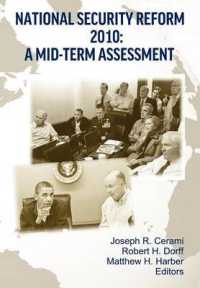Full Description
Why did Islamists respond so differently to the Arab Spring? What do these different responses tell us about Islamists' ideological commitment and resilience, or the contexts within which they were functioning?
This book is based on fieldwork on Islamists in eight Middle Eastern countries: Egypt, Tunisia, Libya, Morocco, Yemen, Jordan, Kuwait and Syria. The contributors trace the transformation of the Islamists' ideology, behaviour, and strategy since the beginning of the Arab Spring. The aim of the book is to show that Islamists necessarily have an interactive and dialectical relationship with the environments in which they find themselves, and that their behaviour and political calculations are based on a wide range of local, regional and global factors. They take into account the impact of the different contexts the groups found themselves in from authoritarian to open and reformist, and contexts of armed conflict and civil war.
An interdisciplinary project, the book captures the ongoing transformation of Islamist parties to explain the reasons why some movements could adapt and make shifts in their discourse and strategy, maintaining organizational coherence and unity, while others fell short and suffered major splits and schisms. The robust theoretical findings update existing literature on Islamism and advance the state of the field.
Contents
Contributors
Preface
Foreword
Acknowledgments
Abbreviations
1. Introduction: Islamists and Revolutions; Khalil al-Anani, Doha Institute for Graduate Studies, Qatar
2. Egypt's Muslim Brotherhood: An Aborted Change; Khalil al-Anani, Doha Institute for Graduate Studies, Qatar
3. The Tunisian Ennahda Party in the Post-Arab Spring: From Islamism to Neo-Islamism; Tarek Chamkhi, The Australian National University, Australia
4. Morocco's Justice and Development Party: Constraints on Participation and PowerPost-2011;
Mohammed Masbah, Moroccan Institute for Policy Analysis (MIPA), Morocco
5. Transformation of Islamist Groups in Syria: Ahrar al-Sham, Jaysh al-Islam, and the Sham Legion; Hamza al-Mustafa, University of Exeter, UK
6. Islamists in Transition: The Yemeni Congregation of Reform - Islah Party; Taha Yaseen, Doha Institute for Graduate Studies, Qatar
7. Islamists in Jordan: The Long Journey of the Muslim Brotherhood's Changes; Mohammad Aburumman, University of Jordan, Jordan
8. Transformations of the Islamic Constitutional Movement in Kuwait; Mubarak Aljeri, Kuwait University, Kuwait
9. Islamism, Autocracy and Revolution: The Moral Bankruptcy of Eradicationism; Abdelwahab El-Affendi, Doha Institute for Graduate Studies, Qatar







